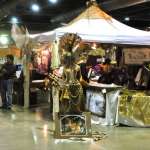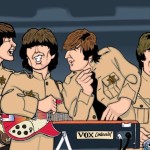June 2, 2014 | Posted in CONVENTIONS | By sockii
Advice for new fans considering attending a well-established convention
Last week I posted my MediaWest*Con 34 convention report, where I talked fairly extensively about the greying of the convention as a whole and how the event seems to be slowly dying. This has been an issue with MediaWest for some time: the fans who have attended there for years are growing older; little if any effort is being put into drawing new attendees (and sometimes people are actively hostile toward them); the workload of running the convention is becoming more than the aging con comm can keep up with. It’s an issue I’ve seen with some other “old school” science fiction/media conventions as well, albeit not to the extent it seems to be affecting MediaWest.
After I posted my con report, I did hear from one person who attended the convention from the first time this year. They asked me the following questions, which I felt would be best answered—from my personal point of view—in a follow-up blog post here:
“I was [at MediaWest*Con] this year for the first time, and I want to bring more folks my age next year. We want to do panels, costuming, art show, you name it, but put our spin on them, since we’re furries and bronies. Do you have any advice as to what we youngsters should look out for, or how we can make this a fun event without intruding on any old schoolers?”
Keep in mind I am not a member of the MediaWest*Con committee, nor do I know them individually specifically well. My impressions of MWC and its atmosphere are those of a reasonably long term (15 years or so) dealer and attendee—someone who, even after all of this time, has never felt fully accepted by the “old school” group who started the convention and were its primary attendees through the 80s and early 90s. But what follows is my advice on how I would approach bringing in a new group of fen to a well-established, long-running convention such as MediaWest, if you wanted to make an effort to be accepted at the event and contribute to it in a positive way.
1. Read the convention’s published rules of conduct—and follow them! Don’t make a bad impression from the start by not following the rules of conduct and decorum of the convention you’re attending. That is, be sure you are familiar with the costuming guidelines, if any are published. Find out if the event is meant to be “all ages” or if more adult-oriented artwork, discussion and materials are permitted (openly or with restrictions on display). Determine if room sales or parties are permitted, if you plan on engaging in these activities. Every convention runs things a little differently so don’t make assumptions that the way things work at one con you’ve been to are standard for every other gathering.
2. Volunteer. Every convention I’ve ever been to has always had need of more people willing to volunteer their time to help out in some way. It could be in offering an hour or two here and there for door security. It could be through running shopping errands for the con suite. It could be in offering to pick up people arriving at the airport, bus station or train terminal. Volunteering is good for your karma—and a way to show that you are not just at the con for your own interests but want to help out and make the event run more smoothly for everyone. It will also likely give you the opportunity to become known and familiar to the con comm and people in charge of various aspects of the event.
3. Sign up for programming and other events. Participate! Find out how panel discussions and programming are determined for the convention, and offer to get involved. For instance, at MediaWest there is a set schedule every year for first suggesting panel discussion topics, then volunteering to moderate panels which have been suggested, and then actually determining the final schedule. This all begins several months before the convention takes place, so you need to be on the ball if you want to get your ideas on the schedule (and, you must have your membership paid for and number assigned before you can suggest and volunteer for panels, so get it early! Don’t wait until the last minute.)
Now, perhaps you’ll suggest a bunch of panels and only a few of them—or maybe even just one—will actually end up on the schedule. I have heard from several people about “politics” in play that can affect panel programming at MWC, but I know in the past I haven’t personally had problems getting new/different topics on the schedule (the trouble being more in getting people to actually show up!) If you feel you are being unfairly shut out of programming, try to discuss it politely with the programming committee before flying off the handle about it. Also keep in mind there are usually some free panel times left in the schedule at the last minute, where you might be able to get in an impromptu/DIY-panel once the convention begins.
Besides programming, get involved in other aspects of the convention like the art show, masquerade, and video show. But as mentioned previously, be sure you’ve read the guidelines for each, and don’t assume that the way things worked at, say, a furry convention are the same as they would at a science fiction or media convention.
4. Host an open room party. Everyone loves a good party! Publicize it with signs/flyers around the convention, and be welcoming to all who may stop by—don’t make it feel like simply a private event for you and your friends with whom you’re attending the convention (of course, it’s fine if you have a private party separately as well.) You might be able to schedule your party in the official con suite/party room, if one is available, so you can have access to audio/video equipment for showing media related to your fannish activities and have more space than in an individual hotel room. Parties are a great way to provide exposure to your particular fannish interests and perhaps draw in new fen.
5. Consider getting a dealers’ table. If there is a group of you coming to the convention, consider getting a dealers table where you can promote any clubs or forums you belong to. Maybe you’ve got some related merchandise and crafts to sell, or freebies to give away. Having a dealers room table gives you a location within official con space where you are visible and can engage directly with other attendees, many who might not otherwise attend specific panels you’re running, or understand your art or costuming. Being there in a central space where just about everyone will walk by at some point is a perfect way to make sure you are seen and have a chance to participate, meet with and engage other attendees.
6. Don’t judge or make fun of the “old school” fans. One sure way to be seen as “interlopers” who “don’t belong” at an established event is to be antagonistic or mocking toward those who have been attending an event for years…maybe even decades. Instead, be respectful of others and their interests, even if you don’t share them. Look for common ground and keep in mind: they likely find your interest in My Little Pony fan-fiction and art as puzzling and “strange” as you find their interest in A-Team slash. Don’t be seen going around snickering at art and fanzines that don’t appeal to you, or worse point them out and go “Ewwww!” That’s a surefire way to get the cold shoulder in return.
7. Be open to learning about and exploring new fandom interests yourself. Don’t just attend and participate in panels and parties you’re running or involved with. Show that you are open and willing to learn more about the long-term attendees and their interests. Even if you’re not all that keen on original series Star Trek or The Man From U.N.C.L.E., stick your head in some panels about them and listen, even if you don’t have anything to add to the conversation. Look for panels that are broad and open to all different kinds of fandoms so that you can participate and hear other points of view (ones on general writing tips and hints, running websites, discussing “orphan fandoms”, etc.)

“Enterprising Women: Television Fandom and the Creation of Popular Myth” by Camille Bacon Smith. One of the first detailed studies of media fandom published in 1991. Get it now at Amazon.
8. Study your fannish history in advance. Spend a little time, before the convention, learning about the gathering’s history and the people who will likely be there. There are some great resources online where you can do this, such as the Fanlore wiki. You may also want to read some of the more academic books that have been published on the history and development of media fan culture…especially as you are likely to run into some of the very people interviewed and spotlighted in these books at the convention! This will help you get a sense of how these communities evolved through the years, past conflicts that may have happened, and what have been major events in various fan communities.
Books I recommend include Camille Bacon-Smith’s Enterprising Women and Henry Jenkins’ Textual Poachers: Television Fans and Participatory Culture.
9. Accept that some people are not going to like that you are there. Period. I know that at MediaWest*Con there are those who are quite happy to let the convention continue along on its slow and steady death march. Not only are they disinterested in younger fans’ take on fandom, they don’t want it intruding on what they perceive as “their space”. As one MediaWest*Con attendee put it in her own 2010 convention report: “I don’t care about attracting younger and newer fen. I don’t give two hoots about gaming or any of their other interests”.
Also understand that many women treasure media fandom—and media fandom conventions—as largely female-oriented and dominated “geek” spaces. MWC has more male attendees than most other media cons I’ve attended in the past, but keep in mind that one of the reasons Star Trek conventions started in the first place was that female fans of the show felt they weren’t welcomed and accepted at traditional literary scifi conventions in the 60s and 70s. There is a long and sad history of harassment of women and misogyny in geek culture, and if you are coming into such female-dominated convention as a group of (largely) male fans, be aware of that history—and how not to add yet another incident to the list. (As a small for instance: do not under any circumstances show up wearing a t-shirt like this one.)
All of the above said, don’t let the rude or negative attitudes you may encounter from some attendees, for no reason other than you are new and into different things, turn you off the convention overall or use it to judge everyone who is there.
10. Even if things go great, don’t assume you’ll eventually be able to “take over” the convention. So you and your friends go to a con and have a terrific time. You make some new friends, you have a good experience with the activities you participated in, you felt welcomed and accepted. Fabulous! Maybe you go back the following year, the year after, and continue to bring in more people and excitement to what felt like a dying convention. Congratulations!
But if the con comm announces they are going to finally retire from running the convention, don’t assume that they’ll gladly hand it over to you and your friends to take it over as “The Next Generation”. Sometimes a con has a good long run, and when those who created the event decide they want to put it to rest, that is their decision to make. They may feel that the convention is “their baby” and they aren’t comfortable with seeing others continue it, even if they keep things constant in how the event is organized and focused. If that’s the case, consider it an opportunity to use the things you’ve learned and perhaps start a new convention entirely of your own—or invite the now “displaced” fans to join you at your already established events and cons. Remember, openness and acceptance should go both ways, right?
Anyway, those are my thoughts on the matter after a weekend’s long pondering. I’d be happy to continue the conversation here, or hear from others who have something to say about bringing in “new” fans to “old” conventions.
Related posts at Spacial Anomaly
sockii
sockii is just your typical Jane-of-All-Trades who never has enough time in her day for all of her projects. She has written for many websites online including Squidoo, Zujava, Yahoo! Contributors Network, HubPages and Wizzley. She has been attending and vending at science fiction and media conventions for over 15 years, and for several years ran an art gallery and jewelry store in Philadelphia. Today she is happy to be living in South Jersey with her partner David and their 6 cats. Sockii is a member of several affiliate sales programs including Amazon Associates and Viglink. Products from these services may be advertised on her posts and pages to generate sales commissions.
4 Comments
Leave a Reply
*













sandy
July 5, 2014
Interesting article; although I’m not familiar with the fandom niche, I read this article because of the general principles and suggestions you made about how “young” and “older” people can get along. The issue of young and older working and living together is worth exploring. Technology is pushing once disparate groups closer together. Thank you for this article.
sockii
July 5, 2014
You’re welcome and you are totally right: the issues in fandom can be very similar to workplace environments and other circumstances when older and younger people need to come together with respect and open-mindedness.
chrissy
March 1, 2015
only problem is that in fandom, there are a lot of older women who refuse to embrace newer ideas or technology because it intrudes on what they’re already set in their ways on.
At least in the workplace, technology more or less forces people to come together due to the work environment at its needs. but fandom is changing away from a lot of people at a quicker pace, and it’s causing tension.
sockii
March 2, 2015
I would agree, but it’s definitely not just the “older women” in fandom who do not embrace change. MediaWest is one of the more gender-mixed media fandom conventions I attend and some of the staff/regulars who are the most stubborn about not be open to new ideas/staff/technology are male. It’s far more a generational thing than a gender thing.